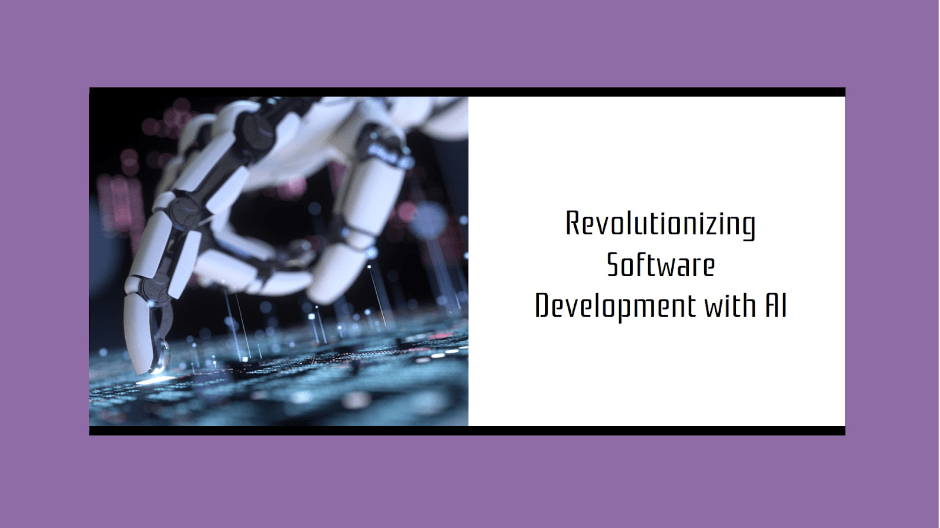In the ever-evolving technological era, artificial intelligence (AI) is impacting almost all industries. The software development sector is no different.
Did you know that the software development AI market size is likely to reach USD 602.4 million by 2026? Yes, that’s true!
The emergence of AI is revolutionizing how software engineers, developers, and coders perform their daily tasks and pushing the boundaries of creativity. From how project requirements are collected to how software applications are developed and managed, the technology has an impact on every stage. Moreover, AI plays a crucial role in simplifying complex coding procedures and increasing the productivity of coders.
In the fast-paced and competitive business landscape, understanding the impact of AI on software development is crucial. It will enable you to leverage the technology, automate processes, and boost productivity. Moreover, it can guide you to build digital products with ease and within the set timeline. As a result, launching applications faster in the market and staying ahead becomes easy.
Also, it will enable you to deliver memorable experiences to the users and win their loyalty. Want to gain deeper insights into the influence of artificial intelligence on software development? Read on to explore everything in detail!
Section 1: Enhancing Development Processes
1.1: Code Generation and Automation
Writing every line of code manually is indeed time-consuming. As a result, the entire software development process is likely to take longer. However, with AI tools, you can automate coding tasks, save a great deal of time, improve accuracy, and boost productivity.
Wondering what AI code generation is? Well, it is all about leveraging AI-powered software tools to write computer codes. Instead of tying every line of code manually, you just need to provide the AI tool with a description of what you want the code to perform.
The tools can generate codes automatically and make your task easier. Some of the popular AI code generation tools you can use are AskCodi, GitHub CoPilot, AlphaCode, and OpenAI Codex.
Using AI for code generation can boost the productivity of software coding professionals by 66%. Moreover, it can speed up the development process and enable you to meet project timelines, thereby ensuring client satisfaction.
1.2: Bug Detection and Resolution
In order to deliver flawless and high-performing software applications, identification of potential bugs before the launch is vital. However, at times, developers may miss out on some flaws owing to the plethora of tasks they handle. That is where the AI tools prove to be helpful.
Artificial intelligence helps analyze complex codes and pinpoint potential irregularities and errors in a hassle-free manner. It enables detection of errors faster and allows fixing the bugs immediately.
Moreover, AI tools can even predict future errors and recommend ways to avoid them. The top tools used for bug detection are FindBugs, Coverity, and CodeSonar.
1.3: Customized Development
Satisfying the users and delivering them exceptional experiences is the key to thriving in the competitive era. However, analyzing the huge volumes of data and understanding the preferences of users can be challenging. The AI tools can make this task pretty simple and straightforward.
AI algorithms are capable of effectively analyzing data in real time. They enable software professionals to learn from user interactions and make accurate predictions based on their preferences.
With the use of AI, you can easily build custom software applications tailored to the behavior patterns and interests of your users. As a result, enhancing user engagement and driving conversion rates becomes easy.
Section 2: Revolutionizing Software Testing
2.1: Automated Testing Tools
To develop feature-rich and high-performing software applications, testing is at the core. While manual testing takes time, AI makes the process simpler and faster. AI-powered automated testing is all about leveraging AI tools to automate test case generation, bug detection, and vulnerability identification.
Automated testing can offer a number of benefits over traditional techniques. For instance, it can enhance speed and efficiency by enabling the faster execution of tests. Moreover, the AI tools can accurately detect potential issues, optimize test coverage, and provide more reliable results.
Flexibility and adaptability are yet another advantage of AI-powered automated software testing. The tools can easily adapt to changing test scenarios, evolving requirements, and varying software landscapes.
2.2: Predictive Analysis in Testing
Before getting started with a software development project, planning and estimating everything is essential. However, it is easier said than done. That is where AI comes into the big picture.
AI tools can make use of historical data from previous projects to identify bottlenecks, optimize resource allocation, and predict software performance. All these can positively impact the software development process.
Predictive analysis can enable you to identify potential problems before deployment and fix them early in the software development lifecycle. It can save valuable time, effort, and money. Moreover, it can also increase the chances of delighting the end users.
2.3: Continuous Integration and Delivery
Integration of AI into the CI/CD pipeline can bring a lot of benefits to the software development teams. Wondering how? The use of AI in CI/CD pipelines can automate the building, deployment, and testing of software applications.
Moreover, integration with version control systems ensures that all the changes are incorporated systematically into the deployment process. As a result, you can expect reliable and frequent releases.
A point to note is that any inconsistency in deployment can have a significant impact on reliability and performance. Automation helps mitigate such risks through the reduction of manual errors, standardization of deployment pipelines, and seamless scalability.
Section 3: AI in Project Management
3.1: Project Planning and Forecasting
Besides software development, AI also plays a pivotal role in project planning and forecasting. The AI-powered tools are capable of analyzing vast amounts of data and delivering accurate forecasts relating to project timelines, budgeting, and resource allocation.
As a result, you can have a clear idea of the time that different tasks of the project will take. It can help in preparing an effective schedule and allocating your resources smartly. Moreover, with the clarity of specific resource requirements, increasing the chances of success of a project becomes easy.
All of these can reduce the burden of the managers and enhance the efficiency of project management. That means you can handle multiple projects with ease.
3.2: Risk Management
Risk assessment and mitigation are vital aspects of project management. The incorporation of AI in project management provides organizations with an opportunity to improve their risk assessment and mitigation strategies.
The AI-driven tools can analyze past project data in real-time and predict potential risks and issues. The best part is that these tools factor in external factors like market trends along with historical project data to deliver a more comprehensive risk assessment.
As a result, managers are in a better position to take proactive measures and manage the risks effectively. Moreover, it can even enable you to come up with appropriate mitigation strategies to address the risks and increase success chances.
Section 4: Challenges and Ethical Considerations
4.1: Dependence on AI and Skill Shift
No doubt, AI brings numerous benefits to software development. However, there are certain drawbacks too. One of them is the over-reliance of the software developers on the AI tools.
If developers heavily rely on the technology for code generation and debugging, they may find themselves in a bind. They may not be willing to acquire the necessary skills to remain competitive in the industry.
A point to note here is unexpected issues may arise during software development that demands a solid understanding of the codes. Only when the developers possess the right skills, they can fix the issues and ensure optimum success.
4.2: AI Bias and Fairness
Data and algorithmic bias are quite common when leveraging AI in software development. It can lead to unintentional discriminatory outcomes and affect user experience. Therefore, it is crucial for developers to address the concerns and ensure optimum fairness.
Wondering how to achieve fairness? One of the best ways is to have a diverse software development team. It ensures that developers from different backgrounds are present in the team and bring unique perspectives to the table.
As a result, it can prevent the AI models from replicating homogenous perspectives and views. Ultimately, it can enhance user experience and drive more traffic.
4.3: Security and Privacy Concerns
The AI tools used for software development rely on data collected from a wide variety of sources. However, data manipulation can affect the quality of software applications developed. Also, incorrect data processing can result in several security and privacy issues. Therefore, developers must adhere to a strict protocol for data processing to address security concerns effectively.
Moreover, it is essential to look for AI tools that comply with relevant privacy and data protection regulations. Conducting security audits regularly can also help uncover potential vulnerabilities. Besides that, leveraging confidential computing can enable you to protect sensitive user data and intellectual property during the AI-driven development process.
Conclusion
AI is indeed transforming custom software development services by streamlining processes, making coding easier, enhancing software testing, facilitating predictive analysis, and driving continuous integration and deployment. No doubt, there are certain challenges in using AI tools in software development. However, the benefits exceed the cons.
The use of AI in software development will continue to increase in the near future. Embracing modern AI tools will enable developers to launch innovative applications faster in the market. Moreover, it can allow you to gain an edge in the competitive era.
Stay updated about the impact of artificial intelligence on software development and make the most of it!
About Author
Harikrishna Kundariya

Harikrishna Kundariya, a marketer, developer, IoT, ChatBot & Blockchain savvy, designer, co-founder, Director of eSparkBiz Technologies. His 12+ years of experience enables him to provide digital solutions to new start-ups based on IoT and SaaS applications.



